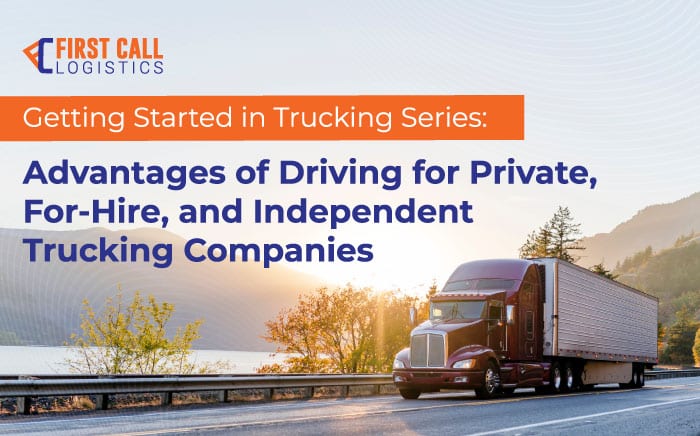Advantages of Driving for Private, For-Hire & Independent Trucking Companies

When seeking a career in the trucking industry, it pays to know what your options are. There are plenty of advantages to being an owner-operator, just as there are benefits to working for a private fleet.
No matter which direction you choose, it’s important to note the current state of the trucking industry. According to Statista, U.S. trucking companies, warehouses and private sector trucking jobs employ an estimated 8.9 million people — including nearly 3.5 million truck drivers. While many industries experienced temporary shutdowns or regression during the COVID-19 pandemic, e-commerce brands and stay-at-home shoppers leaned on trucking companies to scale up their capacity to deliver freight in record time.
Between rising fuel costs and CDL driver shortages, the demand for new blood in the industry is high. Here’s a look at the pros and cons associated with each type of trucking company and what it means for new drivers.
Most Trucking Companies Fall into One of These Three Categories
The business of getting freight from one destination to another requires the logistical expertise of several parties. There are a handful of major models trucking companies follow to keep goods safely transported, stored, and delivered on time:
- Private Fleet Trucking Companies. Sometimes a shipper has access to an in-house fleet of trucks even when its primary business is not trucking. A private fleet employs its own drivers and uses its own equipment to ship the company’s own cargo. Anytime a shipper handles transportation in-house instead of enlisting a third party, it’s considered a private fleet.
- For-Hire Trucking Companies. Probably the type of fleet you’re most familiar with, for-hire trucking companies are third-party carriers. These dedicated fleets are built expressly to contract with and support shippers without access to their own equipment.
- Owner-Operators. Technically, owner-operators fall under the same umbrella as for-hire companies. An owner-operator is an independent contractor who sells their services directly to shippers and/or leases their equipment and services to a motor carrier company. There are a few different ways these free agents can operate alongside for-hire companies (such as lease-purchase drivers), but the key differentiator is they remain small business owners rather than employee drivers.
Advantages of Driving for a Private Fleet
The biggest reason non-shipping companies invest in their own private fleets is the guaranteed capacity to move cargo as needed. Instead of risking a tie-up with a third-party partner, retailers are beginning to see the advantages of keeping their transportation needs in-house (which is why many of them are now considering buying trucking companies after years of pandemic-sparked supply chain issues).
Because these private fleets come so highly valued, driving for a private fleet traditionally brings better pay and a lower turnover rate. It also gives drivers more opportunities to interact directly with customers. However, while private fleets once held several advantages over their for-hire competition in terms of recruiting and retaining drivers pre-pandemic, the gap has narrowed considerably in recent years.
Why For-Hire Companies Are Attracting More Drivers
For-hire fleets have been effectively leveling the playing field by increasing wages, improving benefits, purchasing better equipment and creating optimal trucking routes that allow for more time spent at home. On top of these quality-of-life improvements, these companies are ideal for the inexperienced driver looking to break into the industry. A for-hire company eliminates prohibitive startup costs and may even refund drivers for necessary training courses and CDL requirements in exchange for a contract with the company. The current shortage of drivers means a good measure of negotiating power for new hires.
However, both private and for-hire truckers share a few distinct disadvantages. Working for either type of company means making less than you might as an independent driver, due to all risks and costs associated with the job falling on the shoulders of the employer. Being a company driver also means little control over your schedule, your truck, which jobs you take, and how often you’re expected to be on the road.
Advantages of Being an Owner-Operator
Naturally, the advantages of being an owner-operator are the inverse to being a company driver — unmatched independence and control over jobs, routes, equipment, and time off, but alongside all the inherent risks (and costs) of starting one’s own business. For experienced industry professionals, becoming an owner-operator can be a logical step to maximizing earning power.
Owner-operators can take on their own jobs or lease their services to a more established motor carrier as a contractor.
While there’s no prescriptive one-size-fits-all answer to which is best, the variety of trucking business models enables new talent in the industry to begin quickly in the environment best suited for their level of experience.
Stay Informed with First Call Logistics
At First Call, we’re committed to supporting our carrier network with the resources necessary to be successful. To learn more about First Call’s dedicated and transactional freight opportunities, flexible payment options, and 24/7 carrier support, contact us today.
The 3PL You’ve Been Looking For
Building and managing cost-efficient supply chains is a full-time job. First Call’s rare combination of in-house assets, expert problem-solving and track record of stellar customer service makes us the 3PL of choice for carrier partners looking to make the most of their miles.
“First Call always paid on time and would get me back-hauls whenever possible which was great.”
– Wayne, Carrier
More Resources for Carriers:
Get the latest supply chain news and updates directly to your inbox.